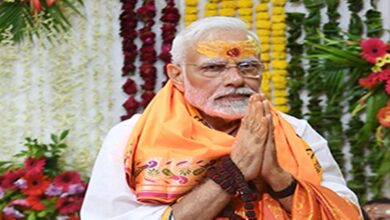Green Revolution Father MS Swaminathan Dies At 98; PM Modi Expresses Grief
The founder of the Indian “green revolution,” renowned agricultural scientist MS Swaminathan, died on Thursday in Chennai at the age of 98. By transforming Indian agriculture in the 1960s and 1970s, Swaminathan, who is often referred to as the “Father of Economic Ecology” by the United Nations Environment Programme, helped India avoid widespread famine and attain food self-sufficiency.
Daughters Soumya Swaminathan, who served as the Chief Scientist for the World Health Organization, Madhura Swaminathan, an economist, and Nitya Swaminathan, a specialist in gender and rural development, are left to carry on Swaminathan’s legacy. His wife, the educator Mina Swaminathan, passed away in March of last year.
Swaminathan’s pioneering work in agriculture, according to Prime Minister Modi, changed the lives of millions of people and guaranteed food security for the country.
“Deeply grieved by Dr. MS Swaminathan Ji’s passing. His pioneering achievement in agriculture improved millions of people’s lives and guaranteed food security for our country at a pivotal time in our country’s history. Renowned plant geneticist and agronomic Swaminathan is credited for bringing high-yielding wheat and rice varieties to India and further refining these strains, according to PM Modi.
The fact that his collaboration with American scientist Norman Borlaug is often credited with saving India from starvation in the 1960s is noteworthy to note.
World Food Prize Awarded to MS Swaminathan
The inaugural World Food Prize, regarded as the greatest honor in the subject of agriculture, was given to MS Swaminathan in 1987. The renowned Ramon Magsaysay Award in 1971 and the Albert Einstein World Award for Science in 1986 are only two of the countless honors he has earned in addition to these.
TIME Magazine praised MS Swaminathan.
Significantly, MS Swaminathan was named one of the twenty most significant Asians of the 20th century by TIME magazine. Along with Mahatma Gandhi and Rabindranath Tagore, he was one of just three Indians to receive such praise.
His groundbreaking agricultural work included the creation and introduction of high-yielding wheat and rice cultivars, which considerably improved food grain output across India.
Aside from this, his creative approach to agriculture, which combined cutting-edge scientific methods with a thorough comprehension of regional circumstances and requirements, improved the lives of countless low-income farmers and boosted the economy of the country.
Other Honors Bestowed Upon MS Swaminathan
Other notable awards received by MS Swaminathan include the Albert Einstein World Science Award in 1986 and the Ramon Magsaysay Award in 1971. Swaminathan was a significant player on the world scene who actively promoted several environmental and agricultural projects.
In addition to receiving the H K Firodia Award, the Lal Bahadur Shastri National Award, and the Indira Gandhi Prize, MS Swaminathan also received the Padma Shri, Padma Bhushan, and Padma Vibhushan awards.
The Professional Life of Swaminathan
Swaminathan held the positions of Director of the Indian Agricultural Research Institute (1961–1972), Director General of the Indian Council of Agricultural Research, and Secretary to the Government of India, Department of Agricultural Research and Education (1972–79), Principal Secretary, Ministry of Agriculture (1979–80), Acting Deputy Chairman and later Member (Science and Agriculture), Planning Commission (1980–82), and Director General, International Rice Organization during his career.







